MBA600 Capstone: Reflective Essay on MBA Learnings at Kaplan School
VerifiedAdded on 2023/03/30
|12
|3049
|219
Essay
AI Summary
This reflective essay delves into the learnings acquired from an MBA program at Kaplan Business School, focusing on the four essential capstone skills: theoretical, applied, practical, and reflective. It highlights the importance of understanding and applying various management theories, such as Maslow's hierarchy of needs and Kotter's 8-step change model, within an organizational context. The essay reflects on the significance of research in organizations, the value of qualitative and quantitative data, and the role of research consultants. Furthermore, it discusses the development of crucial soft skills, including leadership, innovation, and teamwork, and how these skills contribute to a positive work culture and enhanced organizational performance. The reflection extends to personal growth and the anticipated application of these skills in future career endeavors. Desklib provides similar solved assignments and past papers for students.
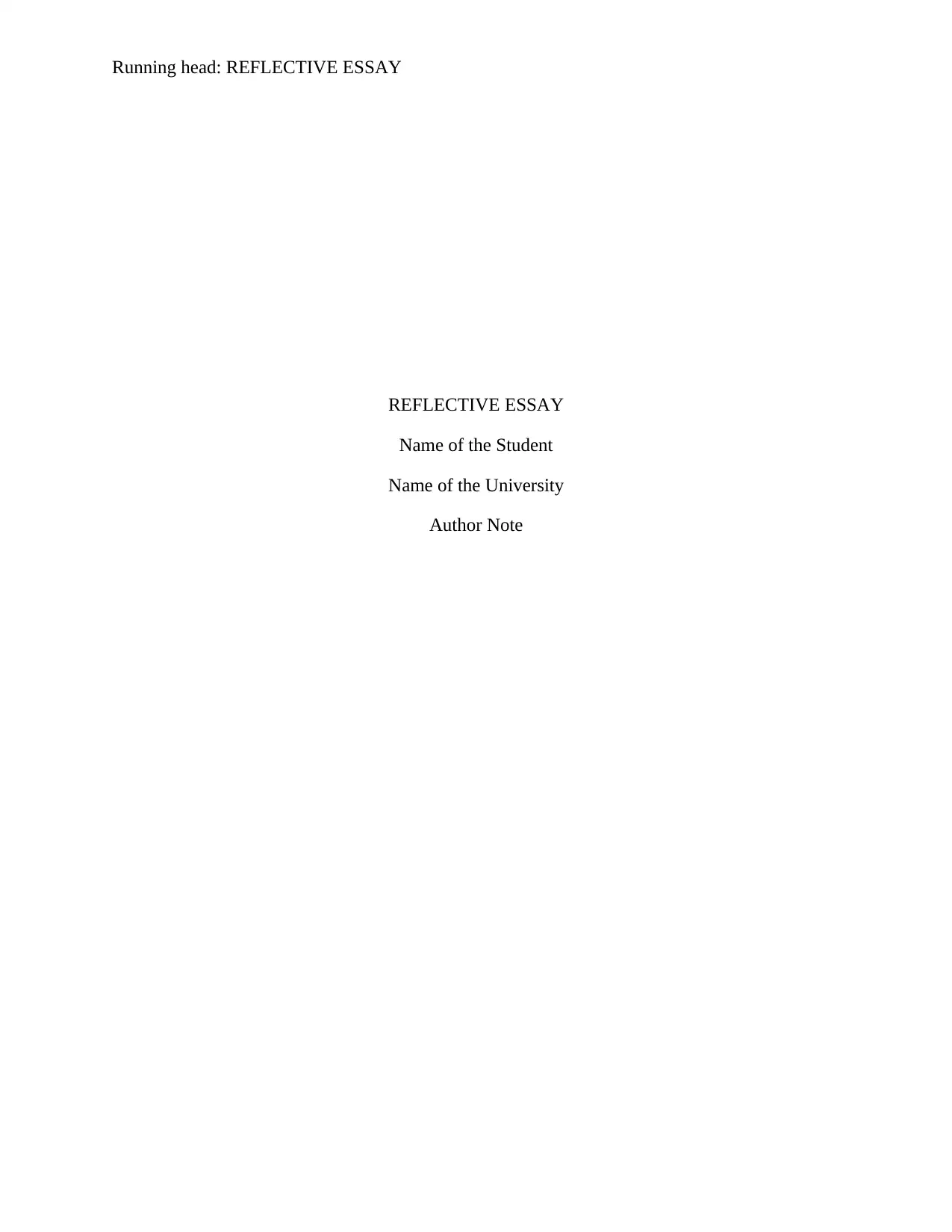
Running head: REFLECTIVE ESSAY
REFLECTIVE ESSAY
Name of the Student
Name of the University
Author Note
REFLECTIVE ESSAY
Name of the Student
Name of the University
Author Note
Paraphrase This Document
Need a fresh take? Get an instant paraphrase of this document with our AI Paraphraser
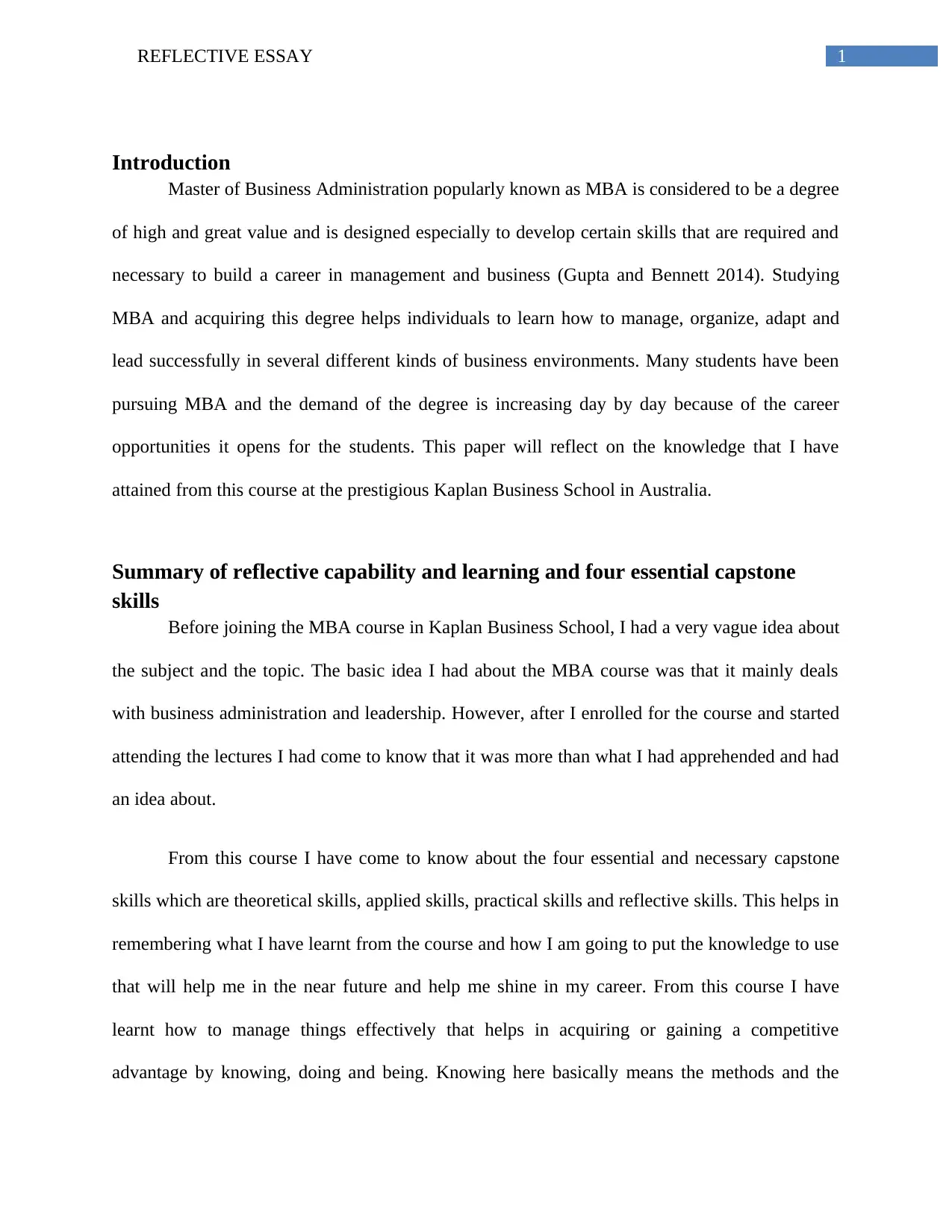
1REFLECTIVE ESSAY
Introduction
Master of Business Administration popularly known as MBA is considered to be a degree
of high and great value and is designed especially to develop certain skills that are required and
necessary to build a career in management and business (Gupta and Bennett 2014). Studying
MBA and acquiring this degree helps individuals to learn how to manage, organize, adapt and
lead successfully in several different kinds of business environments. Many students have been
pursuing MBA and the demand of the degree is increasing day by day because of the career
opportunities it opens for the students. This paper will reflect on the knowledge that I have
attained from this course at the prestigious Kaplan Business School in Australia.
Summary of reflective capability and learning and four essential capstone
skills
Before joining the MBA course in Kaplan Business School, I had a very vague idea about
the subject and the topic. The basic idea I had about the MBA course was that it mainly deals
with business administration and leadership. However, after I enrolled for the course and started
attending the lectures I had come to know that it was more than what I had apprehended and had
an idea about.
From this course I have come to know about the four essential and necessary capstone
skills which are theoretical skills, applied skills, practical skills and reflective skills. This helps in
remembering what I have learnt from the course and how I am going to put the knowledge to use
that will help me in the near future and help me shine in my career. From this course I have
learnt how to manage things effectively that helps in acquiring or gaining a competitive
advantage by knowing, doing and being. Knowing here basically means the methods and the
Introduction
Master of Business Administration popularly known as MBA is considered to be a degree
of high and great value and is designed especially to develop certain skills that are required and
necessary to build a career in management and business (Gupta and Bennett 2014). Studying
MBA and acquiring this degree helps individuals to learn how to manage, organize, adapt and
lead successfully in several different kinds of business environments. Many students have been
pursuing MBA and the demand of the degree is increasing day by day because of the career
opportunities it opens for the students. This paper will reflect on the knowledge that I have
attained from this course at the prestigious Kaplan Business School in Australia.
Summary of reflective capability and learning and four essential capstone
skills
Before joining the MBA course in Kaplan Business School, I had a very vague idea about
the subject and the topic. The basic idea I had about the MBA course was that it mainly deals
with business administration and leadership. However, after I enrolled for the course and started
attending the lectures I had come to know that it was more than what I had apprehended and had
an idea about.
From this course I have come to know about the four essential and necessary capstone
skills which are theoretical skills, applied skills, practical skills and reflective skills. This helps in
remembering what I have learnt from the course and how I am going to put the knowledge to use
that will help me in the near future and help me shine in my career. From this course I have
learnt how to manage things effectively that helps in acquiring or gaining a competitive
advantage by knowing, doing and being. Knowing here basically means the methods and the
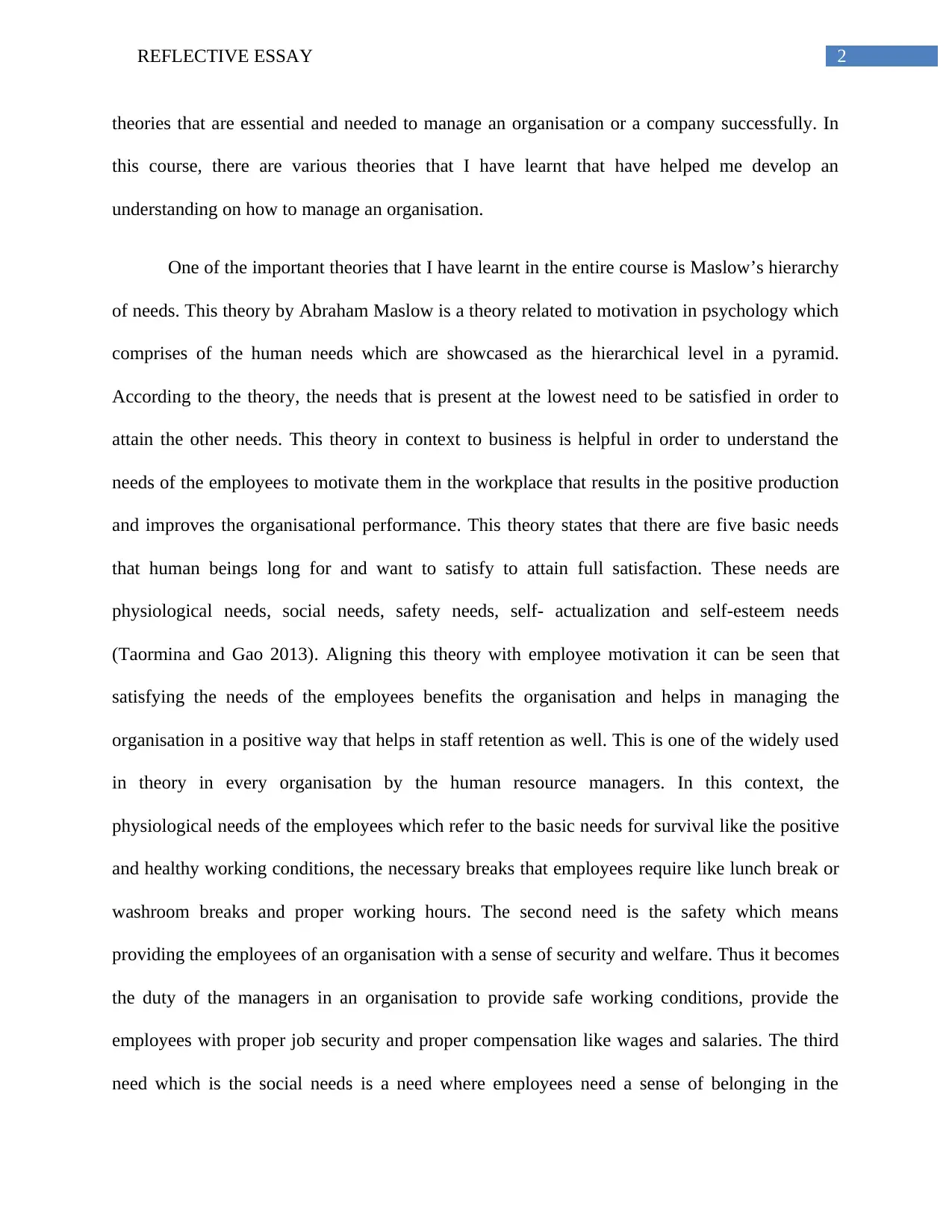
2REFLECTIVE ESSAY
theories that are essential and needed to manage an organisation or a company successfully. In
this course, there are various theories that I have learnt that have helped me develop an
understanding on how to manage an organisation.
One of the important theories that I have learnt in the entire course is Maslow’s hierarchy
of needs. This theory by Abraham Maslow is a theory related to motivation in psychology which
comprises of the human needs which are showcased as the hierarchical level in a pyramid.
According to the theory, the needs that is present at the lowest need to be satisfied in order to
attain the other needs. This theory in context to business is helpful in order to understand the
needs of the employees to motivate them in the workplace that results in the positive production
and improves the organisational performance. This theory states that there are five basic needs
that human beings long for and want to satisfy to attain full satisfaction. These needs are
physiological needs, social needs, safety needs, self- actualization and self-esteem needs
(Taormina and Gao 2013). Aligning this theory with employee motivation it can be seen that
satisfying the needs of the employees benefits the organisation and helps in managing the
organisation in a positive way that helps in staff retention as well. This is one of the widely used
in theory in every organisation by the human resource managers. In this context, the
physiological needs of the employees which refer to the basic needs for survival like the positive
and healthy working conditions, the necessary breaks that employees require like lunch break or
washroom breaks and proper working hours. The second need is the safety which means
providing the employees of an organisation with a sense of security and welfare. Thus it becomes
the duty of the managers in an organisation to provide safe working conditions, provide the
employees with proper job security and proper compensation like wages and salaries. The third
need which is the social needs is a need where employees need a sense of belonging in the
theories that are essential and needed to manage an organisation or a company successfully. In
this course, there are various theories that I have learnt that have helped me develop an
understanding on how to manage an organisation.
One of the important theories that I have learnt in the entire course is Maslow’s hierarchy
of needs. This theory by Abraham Maslow is a theory related to motivation in psychology which
comprises of the human needs which are showcased as the hierarchical level in a pyramid.
According to the theory, the needs that is present at the lowest need to be satisfied in order to
attain the other needs. This theory in context to business is helpful in order to understand the
needs of the employees to motivate them in the workplace that results in the positive production
and improves the organisational performance. This theory states that there are five basic needs
that human beings long for and want to satisfy to attain full satisfaction. These needs are
physiological needs, social needs, safety needs, self- actualization and self-esteem needs
(Taormina and Gao 2013). Aligning this theory with employee motivation it can be seen that
satisfying the needs of the employees benefits the organisation and helps in managing the
organisation in a positive way that helps in staff retention as well. This is one of the widely used
in theory in every organisation by the human resource managers. In this context, the
physiological needs of the employees which refer to the basic needs for survival like the positive
and healthy working conditions, the necessary breaks that employees require like lunch break or
washroom breaks and proper working hours. The second need is the safety which means
providing the employees of an organisation with a sense of security and welfare. Thus it becomes
the duty of the managers in an organisation to provide safe working conditions, provide the
employees with proper job security and proper compensation like wages and salaries. The third
need which is the social needs is a need where employees need a sense of belonging in the
⊘ This is a preview!⊘
Do you want full access?
Subscribe today to unlock all pages.

Trusted by 1+ million students worldwide
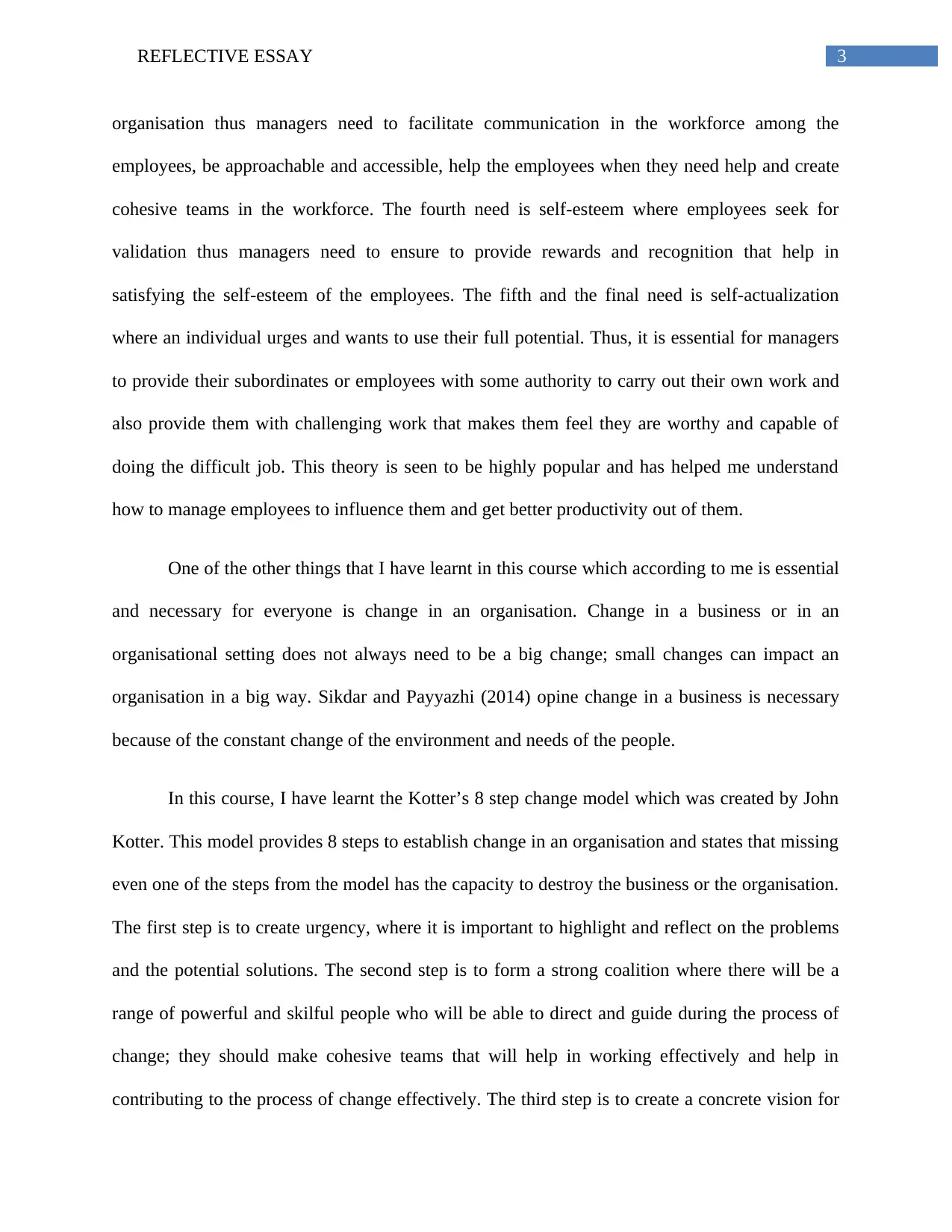
3REFLECTIVE ESSAY
organisation thus managers need to facilitate communication in the workforce among the
employees, be approachable and accessible, help the employees when they need help and create
cohesive teams in the workforce. The fourth need is self-esteem where employees seek for
validation thus managers need to ensure to provide rewards and recognition that help in
satisfying the self-esteem of the employees. The fifth and the final need is self-actualization
where an individual urges and wants to use their full potential. Thus, it is essential for managers
to provide their subordinates or employees with some authority to carry out their own work and
also provide them with challenging work that makes them feel they are worthy and capable of
doing the difficult job. This theory is seen to be highly popular and has helped me understand
how to manage employees to influence them and get better productivity out of them.
One of the other things that I have learnt in this course which according to me is essential
and necessary for everyone is change in an organisation. Change in a business or in an
organisational setting does not always need to be a big change; small changes can impact an
organisation in a big way. Sikdar and Payyazhi (2014) opine change in a business is necessary
because of the constant change of the environment and needs of the people.
In this course, I have learnt the Kotter’s 8 step change model which was created by John
Kotter. This model provides 8 steps to establish change in an organisation and states that missing
even one of the steps from the model has the capacity to destroy the business or the organisation.
The first step is to create urgency, where it is important to highlight and reflect on the problems
and the potential solutions. The second step is to form a strong coalition where there will be a
range of powerful and skilful people who will be able to direct and guide during the process of
change; they should make cohesive teams that will help in working effectively and help in
contributing to the process of change effectively. The third step is to create a concrete vision for
organisation thus managers need to facilitate communication in the workforce among the
employees, be approachable and accessible, help the employees when they need help and create
cohesive teams in the workforce. The fourth need is self-esteem where employees seek for
validation thus managers need to ensure to provide rewards and recognition that help in
satisfying the self-esteem of the employees. The fifth and the final need is self-actualization
where an individual urges and wants to use their full potential. Thus, it is essential for managers
to provide their subordinates or employees with some authority to carry out their own work and
also provide them with challenging work that makes them feel they are worthy and capable of
doing the difficult job. This theory is seen to be highly popular and has helped me understand
how to manage employees to influence them and get better productivity out of them.
One of the other things that I have learnt in this course which according to me is essential
and necessary for everyone is change in an organisation. Change in a business or in an
organisational setting does not always need to be a big change; small changes can impact an
organisation in a big way. Sikdar and Payyazhi (2014) opine change in a business is necessary
because of the constant change of the environment and needs of the people.
In this course, I have learnt the Kotter’s 8 step change model which was created by John
Kotter. This model provides 8 steps to establish change in an organisation and states that missing
even one of the steps from the model has the capacity to destroy the business or the organisation.
The first step is to create urgency, where it is important to highlight and reflect on the problems
and the potential solutions. The second step is to form a strong coalition where there will be a
range of powerful and skilful people who will be able to direct and guide during the process of
change; they should make cohesive teams that will help in working effectively and help in
contributing to the process of change effectively. The third step is to create a concrete vision for
Paraphrase This Document
Need a fresh take? Get an instant paraphrase of this document with our AI Paraphraser
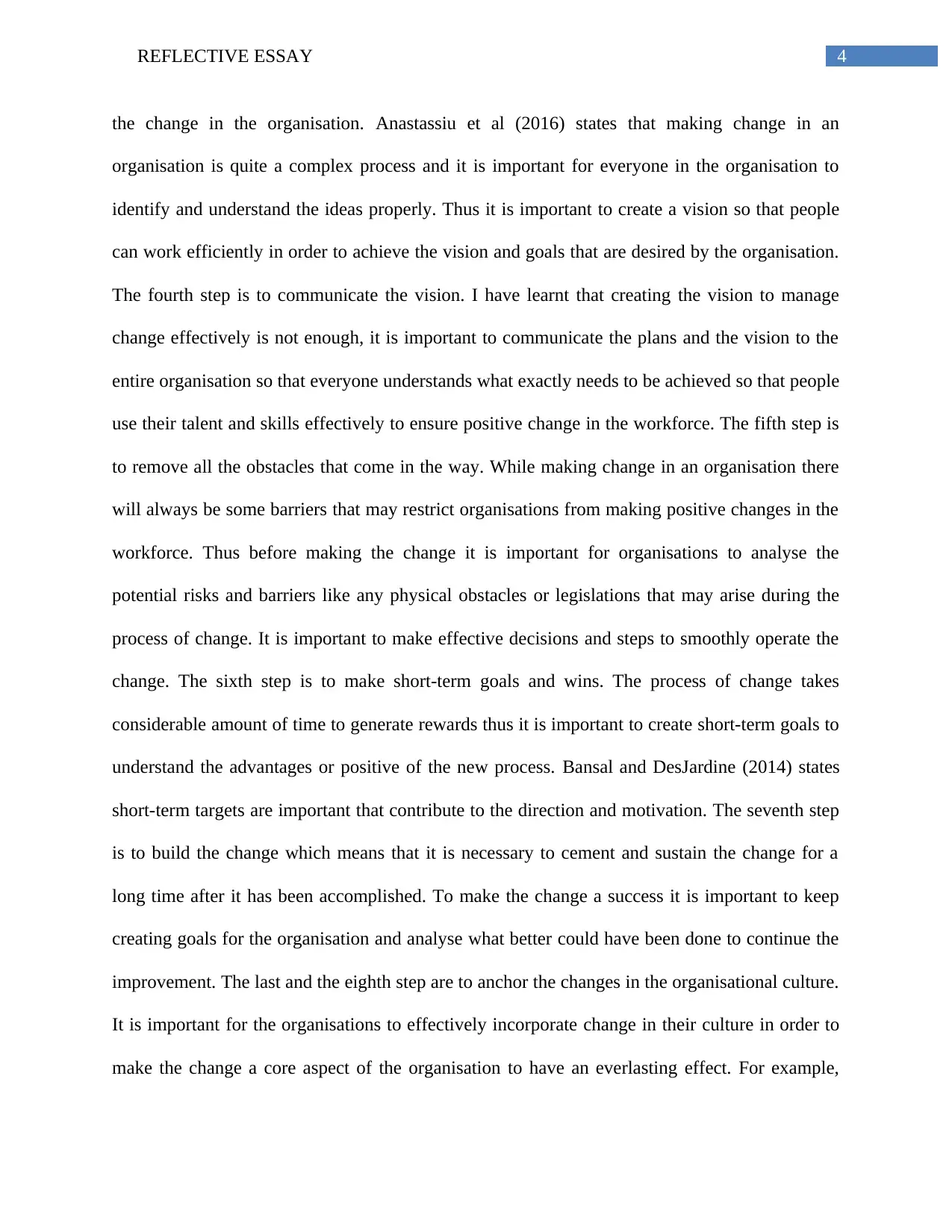
4REFLECTIVE ESSAY
the change in the organisation. Anastassiu et al (2016) states that making change in an
organisation is quite a complex process and it is important for everyone in the organisation to
identify and understand the ideas properly. Thus it is important to create a vision so that people
can work efficiently in order to achieve the vision and goals that are desired by the organisation.
The fourth step is to communicate the vision. I have learnt that creating the vision to manage
change effectively is not enough, it is important to communicate the plans and the vision to the
entire organisation so that everyone understands what exactly needs to be achieved so that people
use their talent and skills effectively to ensure positive change in the workforce. The fifth step is
to remove all the obstacles that come in the way. While making change in an organisation there
will always be some barriers that may restrict organisations from making positive changes in the
workforce. Thus before making the change it is important for organisations to analyse the
potential risks and barriers like any physical obstacles or legislations that may arise during the
process of change. It is important to make effective decisions and steps to smoothly operate the
change. The sixth step is to make short-term goals and wins. The process of change takes
considerable amount of time to generate rewards thus it is important to create short-term goals to
understand the advantages or positive of the new process. Bansal and DesJardine (2014) states
short-term targets are important that contribute to the direction and motivation. The seventh step
is to build the change which means that it is necessary to cement and sustain the change for a
long time after it has been accomplished. To make the change a success it is important to keep
creating goals for the organisation and analyse what better could have been done to continue the
improvement. The last and the eighth step are to anchor the changes in the organisational culture.
It is important for the organisations to effectively incorporate change in their culture in order to
make the change a core aspect of the organisation to have an everlasting effect. For example,
the change in the organisation. Anastassiu et al (2016) states that making change in an
organisation is quite a complex process and it is important for everyone in the organisation to
identify and understand the ideas properly. Thus it is important to create a vision so that people
can work efficiently in order to achieve the vision and goals that are desired by the organisation.
The fourth step is to communicate the vision. I have learnt that creating the vision to manage
change effectively is not enough, it is important to communicate the plans and the vision to the
entire organisation so that everyone understands what exactly needs to be achieved so that people
use their talent and skills effectively to ensure positive change in the workforce. The fifth step is
to remove all the obstacles that come in the way. While making change in an organisation there
will always be some barriers that may restrict organisations from making positive changes in the
workforce. Thus before making the change it is important for organisations to analyse the
potential risks and barriers like any physical obstacles or legislations that may arise during the
process of change. It is important to make effective decisions and steps to smoothly operate the
change. The sixth step is to make short-term goals and wins. The process of change takes
considerable amount of time to generate rewards thus it is important to create short-term goals to
understand the advantages or positive of the new process. Bansal and DesJardine (2014) states
short-term targets are important that contribute to the direction and motivation. The seventh step
is to build the change which means that it is necessary to cement and sustain the change for a
long time after it has been accomplished. To make the change a success it is important to keep
creating goals for the organisation and analyse what better could have been done to continue the
improvement. The last and the eighth step are to anchor the changes in the organisational culture.
It is important for the organisations to effectively incorporate change in their culture in order to
make the change a core aspect of the organisation to have an everlasting effect. For example,
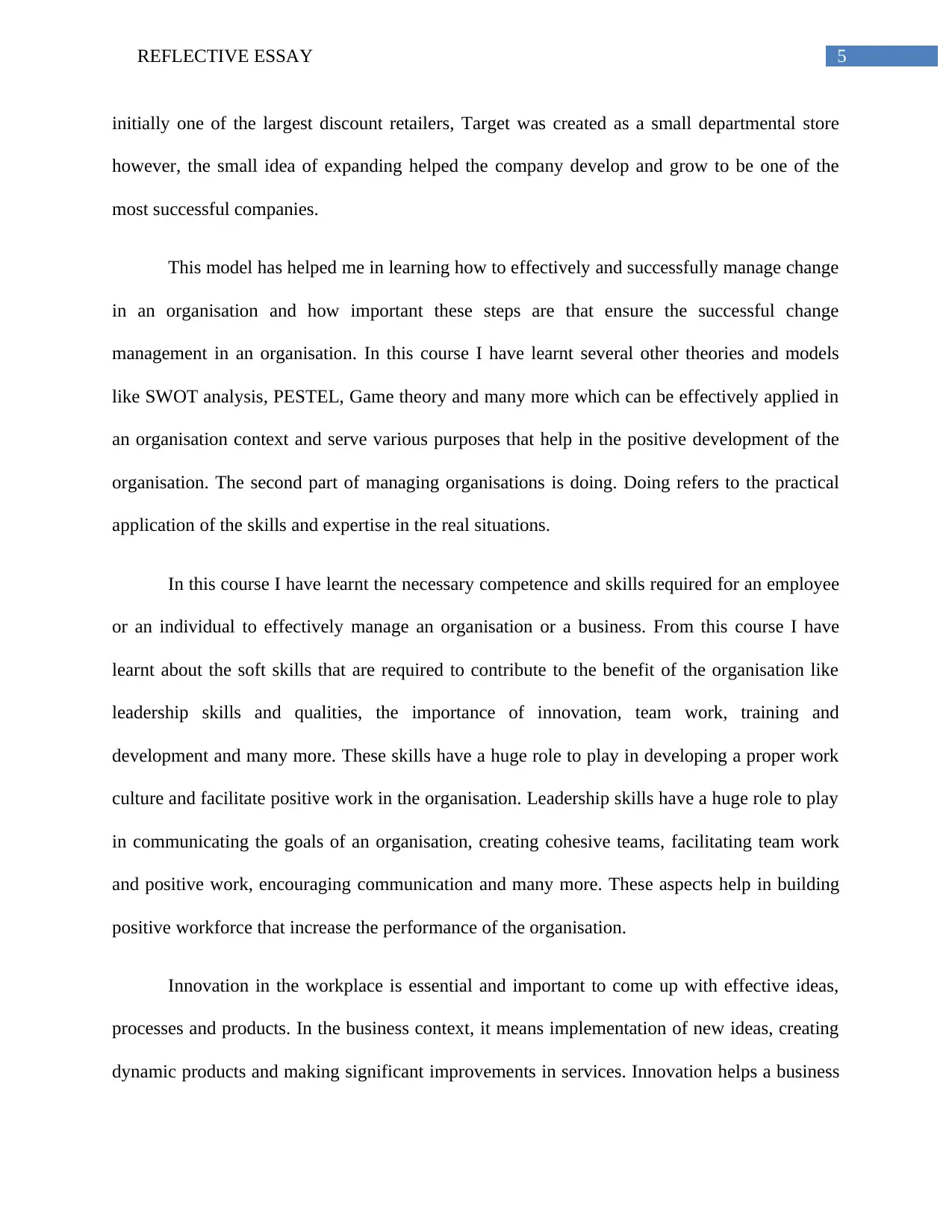
5REFLECTIVE ESSAY
initially one of the largest discount retailers, Target was created as a small departmental store
however, the small idea of expanding helped the company develop and grow to be one of the
most successful companies.
This model has helped me in learning how to effectively and successfully manage change
in an organisation and how important these steps are that ensure the successful change
management in an organisation. In this course I have learnt several other theories and models
like SWOT analysis, PESTEL, Game theory and many more which can be effectively applied in
an organisation context and serve various purposes that help in the positive development of the
organisation. The second part of managing organisations is doing. Doing refers to the practical
application of the skills and expertise in the real situations.
In this course I have learnt the necessary competence and skills required for an employee
or an individual to effectively manage an organisation or a business. From this course I have
learnt about the soft skills that are required to contribute to the benefit of the organisation like
leadership skills and qualities, the importance of innovation, team work, training and
development and many more. These skills have a huge role to play in developing a proper work
culture and facilitate positive work in the organisation. Leadership skills have a huge role to play
in communicating the goals of an organisation, creating cohesive teams, facilitating team work
and positive work, encouraging communication and many more. These aspects help in building
positive workforce that increase the performance of the organisation.
Innovation in the workplace is essential and important to come up with effective ideas,
processes and products. In the business context, it means implementation of new ideas, creating
dynamic products and making significant improvements in services. Innovation helps a business
initially one of the largest discount retailers, Target was created as a small departmental store
however, the small idea of expanding helped the company develop and grow to be one of the
most successful companies.
This model has helped me in learning how to effectively and successfully manage change
in an organisation and how important these steps are that ensure the successful change
management in an organisation. In this course I have learnt several other theories and models
like SWOT analysis, PESTEL, Game theory and many more which can be effectively applied in
an organisation context and serve various purposes that help in the positive development of the
organisation. The second part of managing organisations is doing. Doing refers to the practical
application of the skills and expertise in the real situations.
In this course I have learnt the necessary competence and skills required for an employee
or an individual to effectively manage an organisation or a business. From this course I have
learnt about the soft skills that are required to contribute to the benefit of the organisation like
leadership skills and qualities, the importance of innovation, team work, training and
development and many more. These skills have a huge role to play in developing a proper work
culture and facilitate positive work in the organisation. Leadership skills have a huge role to play
in communicating the goals of an organisation, creating cohesive teams, facilitating team work
and positive work, encouraging communication and many more. These aspects help in building
positive workforce that increase the performance of the organisation.
Innovation in the workplace is essential and important to come up with effective ideas,
processes and products. In the business context, it means implementation of new ideas, creating
dynamic products and making significant improvements in services. Innovation helps a business
⊘ This is a preview!⊘
Do you want full access?
Subscribe today to unlock all pages.

Trusted by 1+ million students worldwide
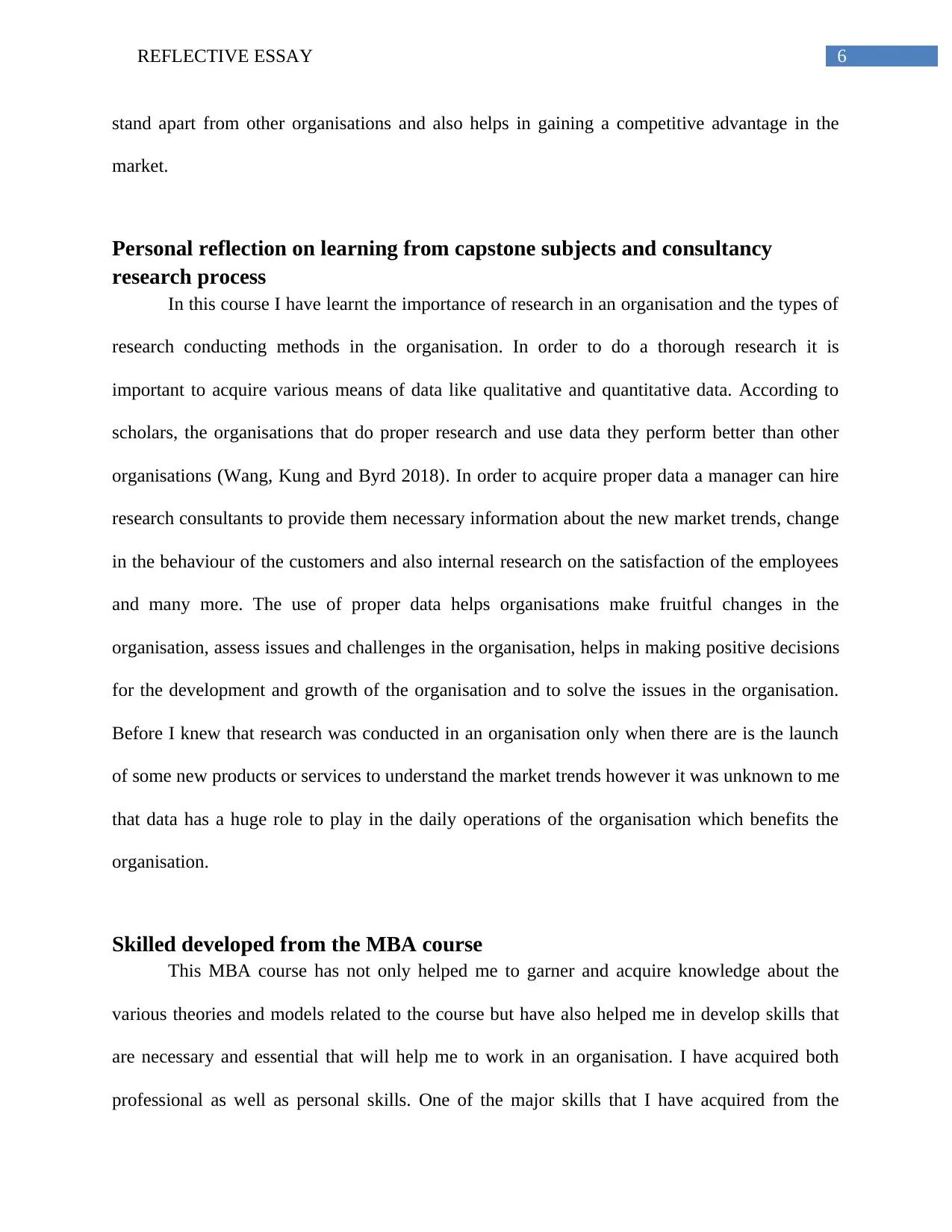
6REFLECTIVE ESSAY
stand apart from other organisations and also helps in gaining a competitive advantage in the
market.
Personal reflection on learning from capstone subjects and consultancy
research process
In this course I have learnt the importance of research in an organisation and the types of
research conducting methods in the organisation. In order to do a thorough research it is
important to acquire various means of data like qualitative and quantitative data. According to
scholars, the organisations that do proper research and use data they perform better than other
organisations (Wang, Kung and Byrd 2018). In order to acquire proper data a manager can hire
research consultants to provide them necessary information about the new market trends, change
in the behaviour of the customers and also internal research on the satisfaction of the employees
and many more. The use of proper data helps organisations make fruitful changes in the
organisation, assess issues and challenges in the organisation, helps in making positive decisions
for the development and growth of the organisation and to solve the issues in the organisation.
Before I knew that research was conducted in an organisation only when there are is the launch
of some new products or services to understand the market trends however it was unknown to me
that data has a huge role to play in the daily operations of the organisation which benefits the
organisation.
Skilled developed from the MBA course
This MBA course has not only helped me to garner and acquire knowledge about the
various theories and models related to the course but have also helped me in develop skills that
are necessary and essential that will help me to work in an organisation. I have acquired both
professional as well as personal skills. One of the major skills that I have acquired from the
stand apart from other organisations and also helps in gaining a competitive advantage in the
market.
Personal reflection on learning from capstone subjects and consultancy
research process
In this course I have learnt the importance of research in an organisation and the types of
research conducting methods in the organisation. In order to do a thorough research it is
important to acquire various means of data like qualitative and quantitative data. According to
scholars, the organisations that do proper research and use data they perform better than other
organisations (Wang, Kung and Byrd 2018). In order to acquire proper data a manager can hire
research consultants to provide them necessary information about the new market trends, change
in the behaviour of the customers and also internal research on the satisfaction of the employees
and many more. The use of proper data helps organisations make fruitful changes in the
organisation, assess issues and challenges in the organisation, helps in making positive decisions
for the development and growth of the organisation and to solve the issues in the organisation.
Before I knew that research was conducted in an organisation only when there are is the launch
of some new products or services to understand the market trends however it was unknown to me
that data has a huge role to play in the daily operations of the organisation which benefits the
organisation.
Skilled developed from the MBA course
This MBA course has not only helped me to garner and acquire knowledge about the
various theories and models related to the course but have also helped me in develop skills that
are necessary and essential that will help me to work in an organisation. I have acquired both
professional as well as personal skills. One of the major skills that I have acquired from the
Paraphrase This Document
Need a fresh take? Get an instant paraphrase of this document with our AI Paraphraser
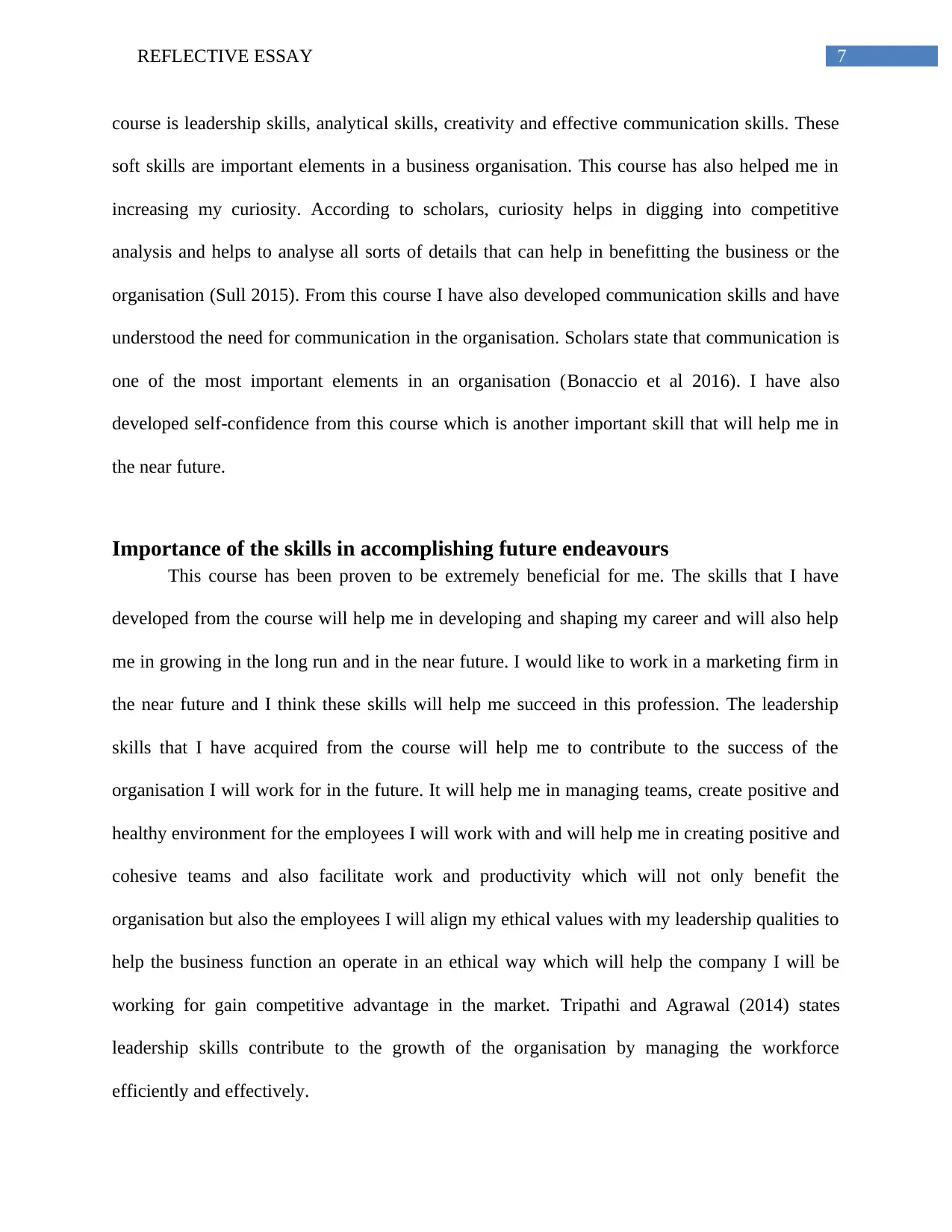
7REFLECTIVE ESSAY
course is leadership skills, analytical skills, creativity and effective communication skills. These
soft skills are important elements in a business organisation. This course has also helped me in
increasing my curiosity. According to scholars, curiosity helps in digging into competitive
analysis and helps to analyse all sorts of details that can help in benefitting the business or the
organisation (Sull 2015). From this course I have also developed communication skills and have
understood the need for communication in the organisation. Scholars state that communication is
one of the most important elements in an organisation (Bonaccio et al 2016). I have also
developed self-confidence from this course which is another important skill that will help me in
the near future.
Importance of the skills in accomplishing future endeavours
This course has been proven to be extremely beneficial for me. The skills that I have
developed from the course will help me in developing and shaping my career and will also help
me in growing in the long run and in the near future. I would like to work in a marketing firm in
the near future and I think these skills will help me succeed in this profession. The leadership
skills that I have acquired from the course will help me to contribute to the success of the
organisation I will work for in the future. It will help me in managing teams, create positive and
healthy environment for the employees I will work with and will help me in creating positive and
cohesive teams and also facilitate work and productivity which will not only benefit the
organisation but also the employees I will align my ethical values with my leadership qualities to
help the business function an operate in an ethical way which will help the company I will be
working for gain competitive advantage in the market. Tripathi and Agrawal (2014) states
leadership skills contribute to the growth of the organisation by managing the workforce
efficiently and effectively.
course is leadership skills, analytical skills, creativity and effective communication skills. These
soft skills are important elements in a business organisation. This course has also helped me in
increasing my curiosity. According to scholars, curiosity helps in digging into competitive
analysis and helps to analyse all sorts of details that can help in benefitting the business or the
organisation (Sull 2015). From this course I have also developed communication skills and have
understood the need for communication in the organisation. Scholars state that communication is
one of the most important elements in an organisation (Bonaccio et al 2016). I have also
developed self-confidence from this course which is another important skill that will help me in
the near future.
Importance of the skills in accomplishing future endeavours
This course has been proven to be extremely beneficial for me. The skills that I have
developed from the course will help me in developing and shaping my career and will also help
me in growing in the long run and in the near future. I would like to work in a marketing firm in
the near future and I think these skills will help me succeed in this profession. The leadership
skills that I have acquired from the course will help me to contribute to the success of the
organisation I will work for in the future. It will help me in managing teams, create positive and
healthy environment for the employees I will work with and will help me in creating positive and
cohesive teams and also facilitate work and productivity which will not only benefit the
organisation but also the employees I will align my ethical values with my leadership qualities to
help the business function an operate in an ethical way which will help the company I will be
working for gain competitive advantage in the market. Tripathi and Agrawal (2014) states
leadership skills contribute to the growth of the organisation by managing the workforce
efficiently and effectively.
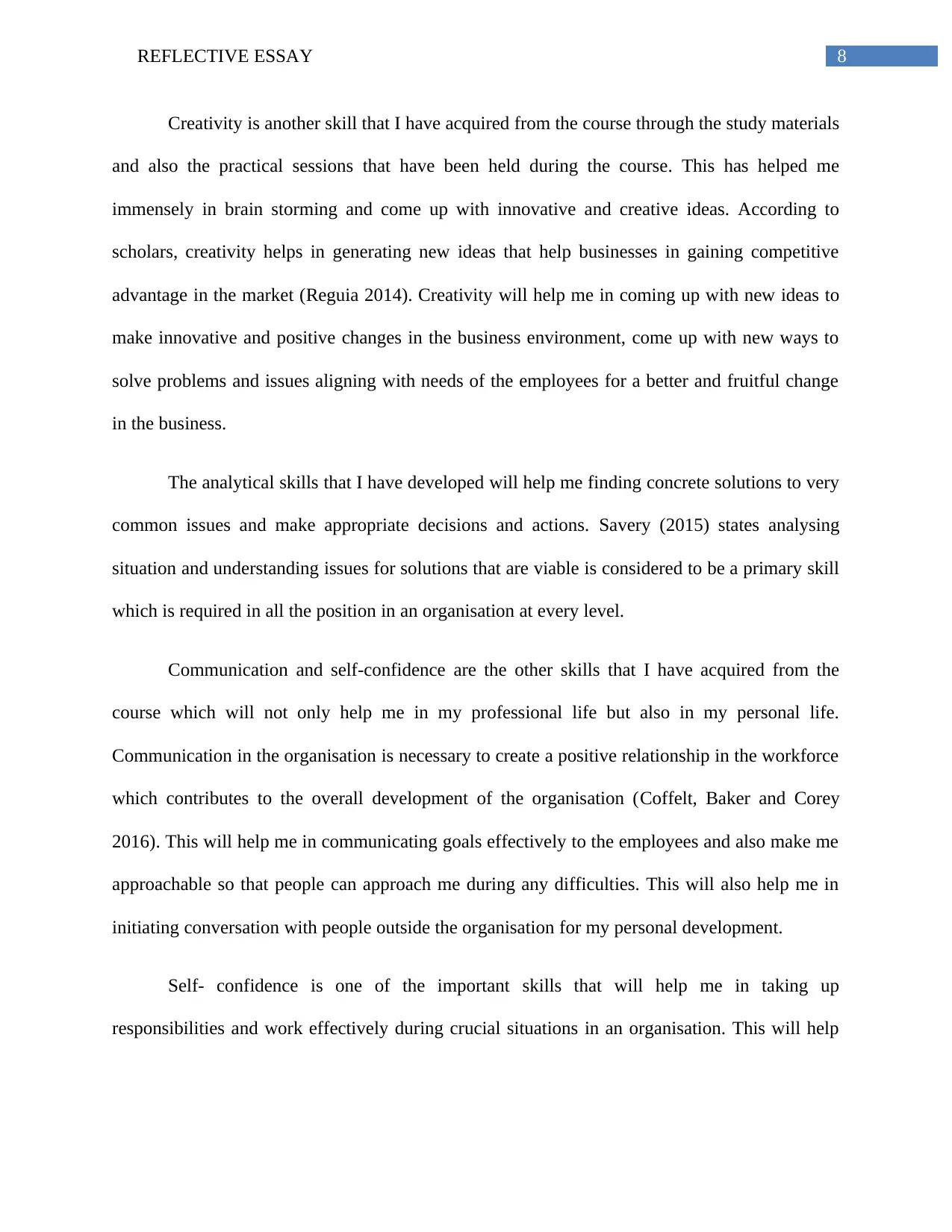
8REFLECTIVE ESSAY
Creativity is another skill that I have acquired from the course through the study materials
and also the practical sessions that have been held during the course. This has helped me
immensely in brain storming and come up with innovative and creative ideas. According to
scholars, creativity helps in generating new ideas that help businesses in gaining competitive
advantage in the market (Reguia 2014). Creativity will help me in coming up with new ideas to
make innovative and positive changes in the business environment, come up with new ways to
solve problems and issues aligning with needs of the employees for a better and fruitful change
in the business.
The analytical skills that I have developed will help me finding concrete solutions to very
common issues and make appropriate decisions and actions. Savery (2015) states analysing
situation and understanding issues for solutions that are viable is considered to be a primary skill
which is required in all the position in an organisation at every level.
Communication and self-confidence are the other skills that I have acquired from the
course which will not only help me in my professional life but also in my personal life.
Communication in the organisation is necessary to create a positive relationship in the workforce
which contributes to the overall development of the organisation (Coffelt, Baker and Corey
2016). This will help me in communicating goals effectively to the employees and also make me
approachable so that people can approach me during any difficulties. This will also help me in
initiating conversation with people outside the organisation for my personal development.
Self- confidence is one of the important skills that will help me in taking up
responsibilities and work effectively during crucial situations in an organisation. This will help
Creativity is another skill that I have acquired from the course through the study materials
and also the practical sessions that have been held during the course. This has helped me
immensely in brain storming and come up with innovative and creative ideas. According to
scholars, creativity helps in generating new ideas that help businesses in gaining competitive
advantage in the market (Reguia 2014). Creativity will help me in coming up with new ideas to
make innovative and positive changes in the business environment, come up with new ways to
solve problems and issues aligning with needs of the employees for a better and fruitful change
in the business.
The analytical skills that I have developed will help me finding concrete solutions to very
common issues and make appropriate decisions and actions. Savery (2015) states analysing
situation and understanding issues for solutions that are viable is considered to be a primary skill
which is required in all the position in an organisation at every level.
Communication and self-confidence are the other skills that I have acquired from the
course which will not only help me in my professional life but also in my personal life.
Communication in the organisation is necessary to create a positive relationship in the workforce
which contributes to the overall development of the organisation (Coffelt, Baker and Corey
2016). This will help me in communicating goals effectively to the employees and also make me
approachable so that people can approach me during any difficulties. This will also help me in
initiating conversation with people outside the organisation for my personal development.
Self- confidence is one of the important skills that will help me in taking up
responsibilities and work effectively during crucial situations in an organisation. This will help
⊘ This is a preview!⊘
Do you want full access?
Subscribe today to unlock all pages.

Trusted by 1+ million students worldwide
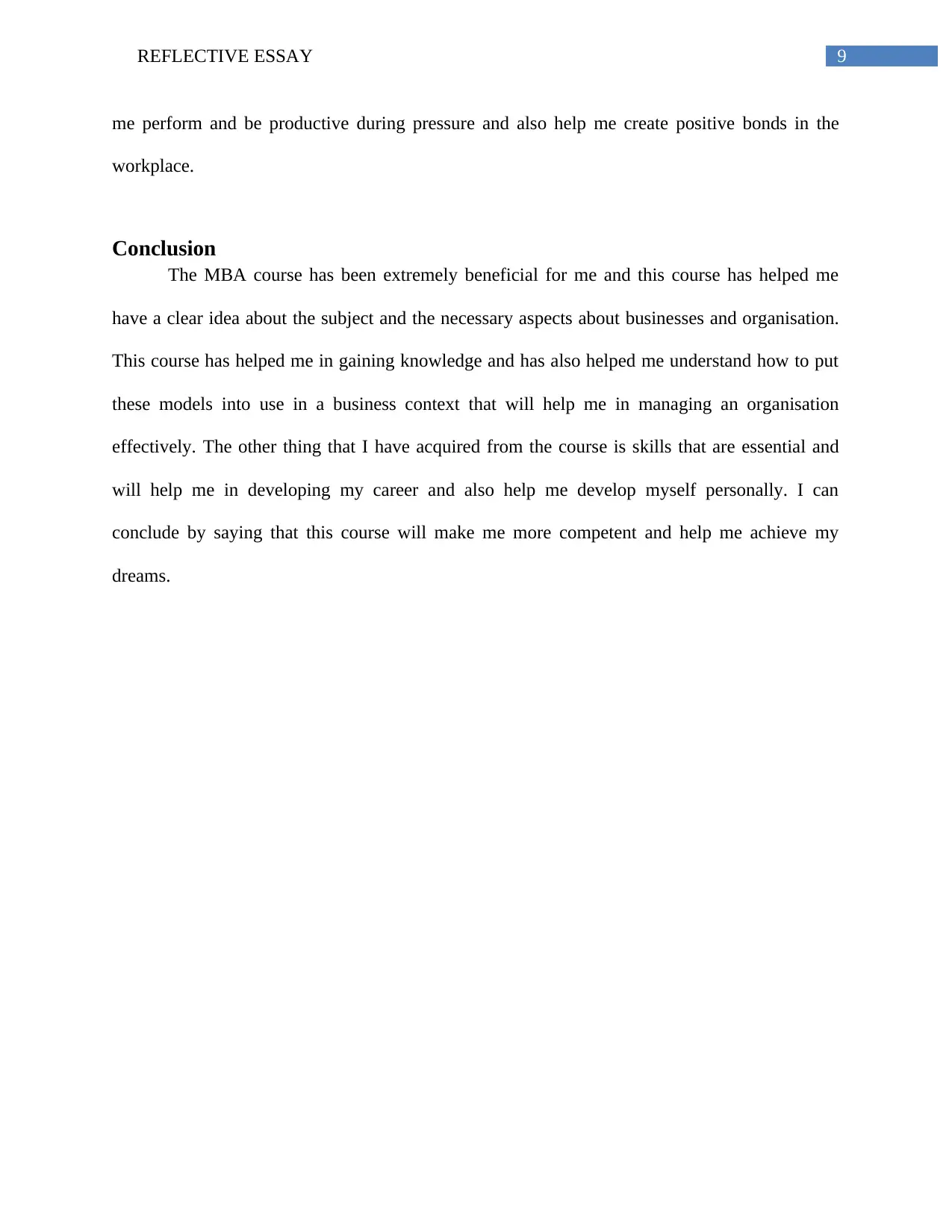
9REFLECTIVE ESSAY
me perform and be productive during pressure and also help me create positive bonds in the
workplace.
Conclusion
The MBA course has been extremely beneficial for me and this course has helped me
have a clear idea about the subject and the necessary aspects about businesses and organisation.
This course has helped me in gaining knowledge and has also helped me understand how to put
these models into use in a business context that will help me in managing an organisation
effectively. The other thing that I have acquired from the course is skills that are essential and
will help me in developing my career and also help me develop myself personally. I can
conclude by saying that this course will make me more competent and help me achieve my
dreams.
me perform and be productive during pressure and also help me create positive bonds in the
workplace.
Conclusion
The MBA course has been extremely beneficial for me and this course has helped me
have a clear idea about the subject and the necessary aspects about businesses and organisation.
This course has helped me in gaining knowledge and has also helped me understand how to put
these models into use in a business context that will help me in managing an organisation
effectively. The other thing that I have acquired from the course is skills that are essential and
will help me in developing my career and also help me develop myself personally. I can
conclude by saying that this course will make me more competent and help me achieve my
dreams.
Paraphrase This Document
Need a fresh take? Get an instant paraphrase of this document with our AI Paraphraser
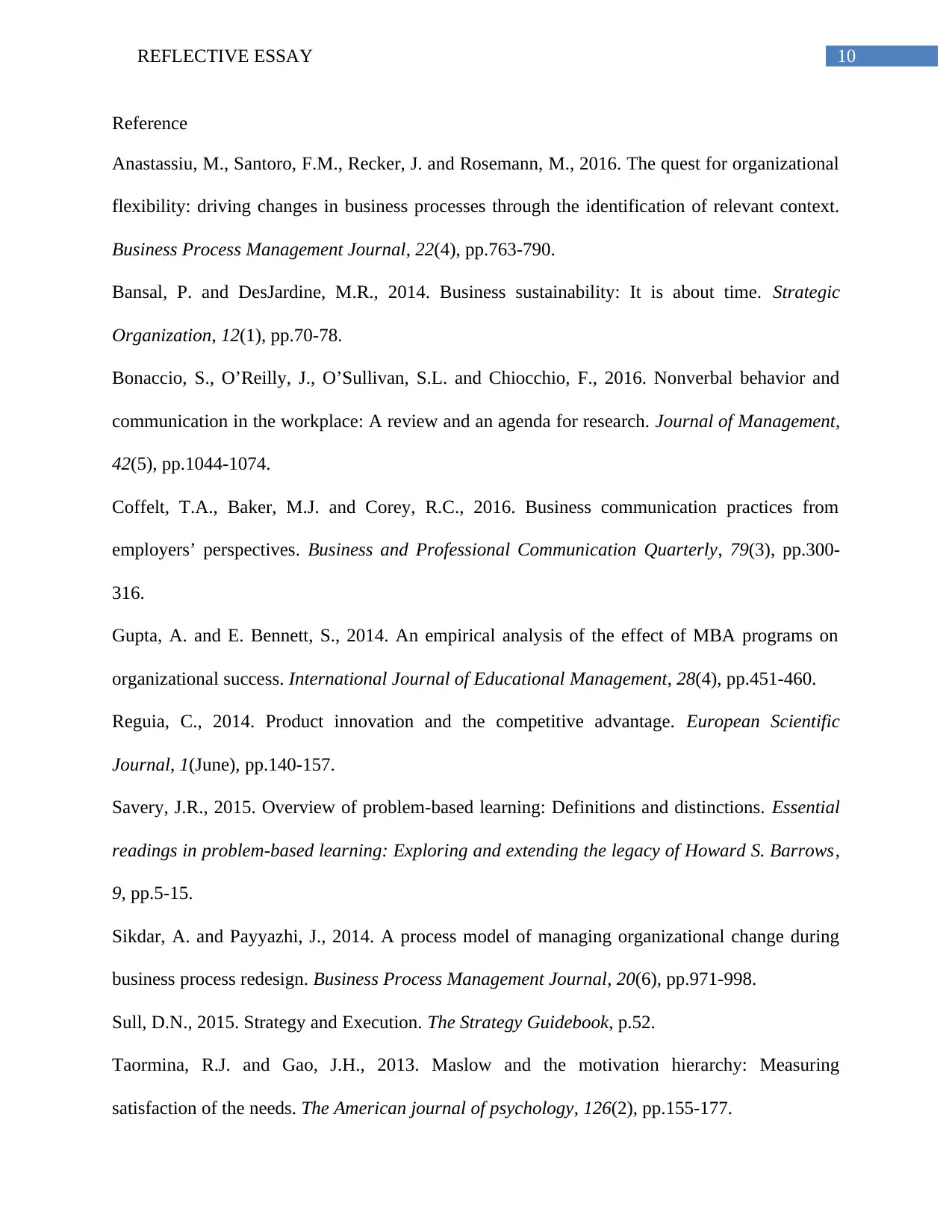
10REFLECTIVE ESSAY
Reference
Anastassiu, M., Santoro, F.M., Recker, J. and Rosemann, M., 2016. The quest for organizational
flexibility: driving changes in business processes through the identification of relevant context.
Business Process Management Journal, 22(4), pp.763-790.
Bansal, P. and DesJardine, M.R., 2014. Business sustainability: It is about time. Strategic
Organization, 12(1), pp.70-78.
Bonaccio, S., O’Reilly, J., O’Sullivan, S.L. and Chiocchio, F., 2016. Nonverbal behavior and
communication in the workplace: A review and an agenda for research. Journal of Management,
42(5), pp.1044-1074.
Coffelt, T.A., Baker, M.J. and Corey, R.C., 2016. Business communication practices from
employers’ perspectives. Business and Professional Communication Quarterly, 79(3), pp.300-
316.
Gupta, A. and E. Bennett, S., 2014. An empirical analysis of the effect of MBA programs on
organizational success. International Journal of Educational Management, 28(4), pp.451-460.
Reguia, C., 2014. Product innovation and the competitive advantage. European Scientific
Journal, 1(June), pp.140-157.
Savery, J.R., 2015. Overview of problem-based learning: Definitions and distinctions. Essential
readings in problem-based learning: Exploring and extending the legacy of Howard S. Barrows,
9, pp.5-15.
Sikdar, A. and Payyazhi, J., 2014. A process model of managing organizational change during
business process redesign. Business Process Management Journal, 20(6), pp.971-998.
Sull, D.N., 2015. Strategy and Execution. The Strategy Guidebook, p.52.
Taormina, R.J. and Gao, J.H., 2013. Maslow and the motivation hierarchy: Measuring
satisfaction of the needs. The American journal of psychology, 126(2), pp.155-177.
Reference
Anastassiu, M., Santoro, F.M., Recker, J. and Rosemann, M., 2016. The quest for organizational
flexibility: driving changes in business processes through the identification of relevant context.
Business Process Management Journal, 22(4), pp.763-790.
Bansal, P. and DesJardine, M.R., 2014. Business sustainability: It is about time. Strategic
Organization, 12(1), pp.70-78.
Bonaccio, S., O’Reilly, J., O’Sullivan, S.L. and Chiocchio, F., 2016. Nonverbal behavior and
communication in the workplace: A review and an agenda for research. Journal of Management,
42(5), pp.1044-1074.
Coffelt, T.A., Baker, M.J. and Corey, R.C., 2016. Business communication practices from
employers’ perspectives. Business and Professional Communication Quarterly, 79(3), pp.300-
316.
Gupta, A. and E. Bennett, S., 2014. An empirical analysis of the effect of MBA programs on
organizational success. International Journal of Educational Management, 28(4), pp.451-460.
Reguia, C., 2014. Product innovation and the competitive advantage. European Scientific
Journal, 1(June), pp.140-157.
Savery, J.R., 2015. Overview of problem-based learning: Definitions and distinctions. Essential
readings in problem-based learning: Exploring and extending the legacy of Howard S. Barrows,
9, pp.5-15.
Sikdar, A. and Payyazhi, J., 2014. A process model of managing organizational change during
business process redesign. Business Process Management Journal, 20(6), pp.971-998.
Sull, D.N., 2015. Strategy and Execution. The Strategy Guidebook, p.52.
Taormina, R.J. and Gao, J.H., 2013. Maslow and the motivation hierarchy: Measuring
satisfaction of the needs. The American journal of psychology, 126(2), pp.155-177.
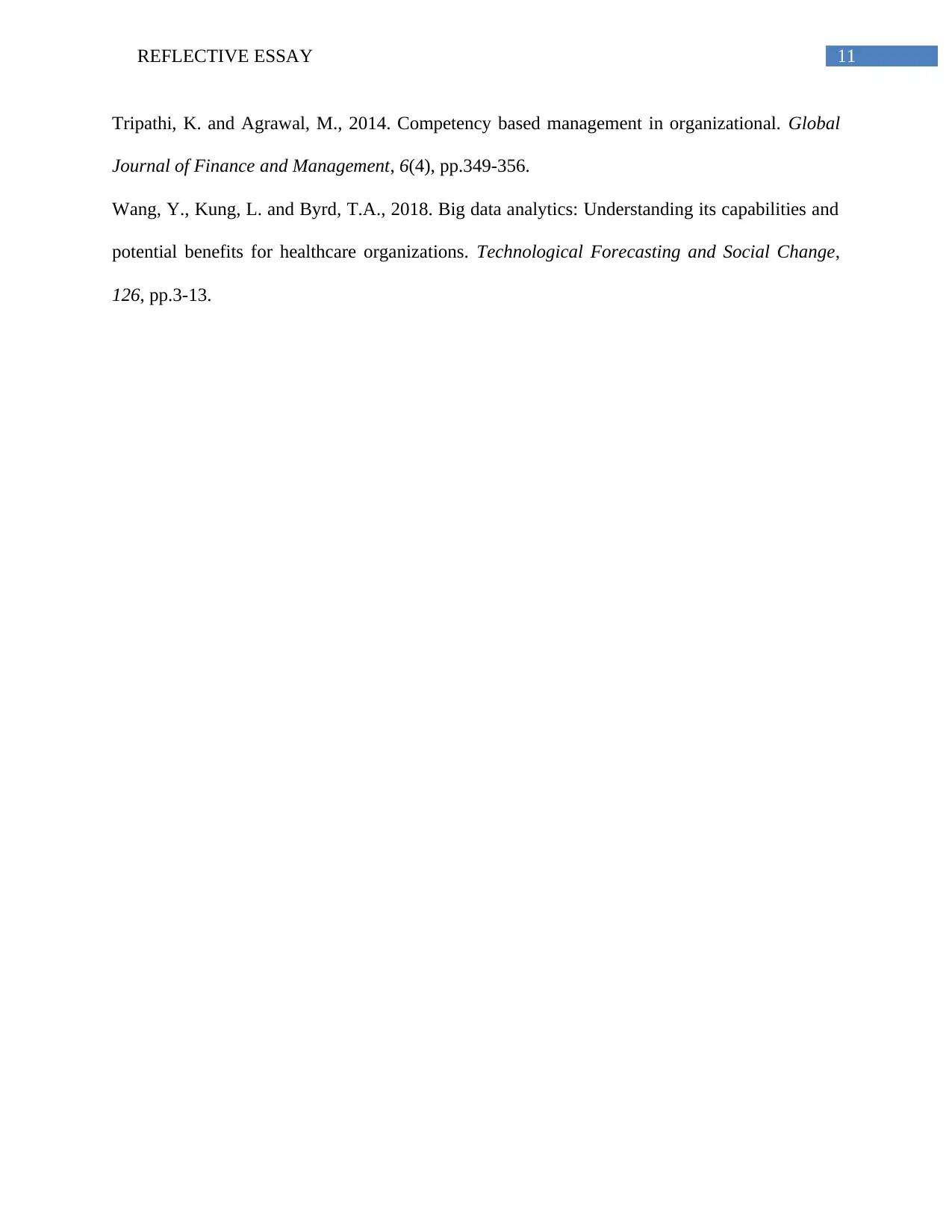
11REFLECTIVE ESSAY
Tripathi, K. and Agrawal, M., 2014. Competency based management in organizational. Global
Journal of Finance and Management, 6(4), pp.349-356.
Wang, Y., Kung, L. and Byrd, T.A., 2018. Big data analytics: Understanding its capabilities and
potential benefits for healthcare organizations. Technological Forecasting and Social Change,
126, pp.3-13.
Tripathi, K. and Agrawal, M., 2014. Competency based management in organizational. Global
Journal of Finance and Management, 6(4), pp.349-356.
Wang, Y., Kung, L. and Byrd, T.A., 2018. Big data analytics: Understanding its capabilities and
potential benefits for healthcare organizations. Technological Forecasting and Social Change,
126, pp.3-13.
⊘ This is a preview!⊘
Do you want full access?
Subscribe today to unlock all pages.

Trusted by 1+ million students worldwide
1 out of 12
Related Documents
Your All-in-One AI-Powered Toolkit for Academic Success.
+13062052269
info@desklib.com
Available 24*7 on WhatsApp / Email
![[object Object]](/_next/static/media/star-bottom.7253800d.svg)
Unlock your academic potential
Copyright © 2020–2026 A2Z Services. All Rights Reserved. Developed and managed by ZUCOL.



